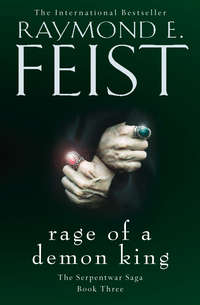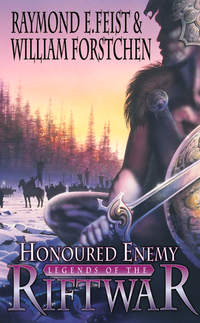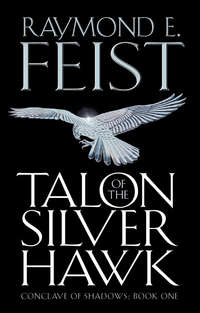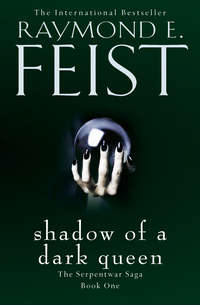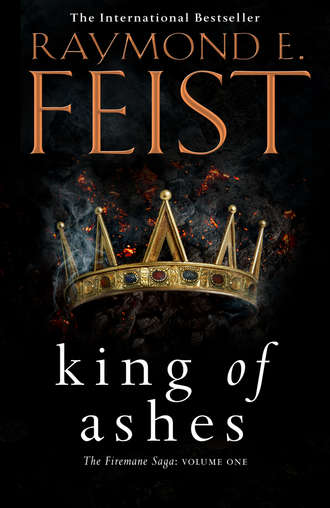
Полная версия
King of Ashes
He quickly tossed aside following them through the door. Since he had no idea what sort of obstacles, what potential cover, or how many other people might lie in the gloom inside, it was too risky.
He moved quickly to the left corner of the cathedral and peered around it. The connecting wall was still a low course of stones just high enough for Hatu to hide behind. He ducked and began to walk just outside the wall on a parallel course to what he judged to be the one taken by the two men from the doorway.
Hatu tried to ignore the fact that any mistake on his part would likely result in his death. The main purpose of his training, like that of all students of Coaltachin, was not to be detected. He focused on employing every trick and skill he had learned so far.
Duck-walking, as it was called, was difficult even for a gifted youngster like Hatu; his thighs and hips were protesting painfully when he heard the voices again from within the shadows and paused gratefully. He straightened slowly and glanced over his shoulder, memorizing the way, in case he found himself leaving this location in a hurry. There was just enough light that he could see darker shapes in the gloom, with an occasional reflection from a source in the city below.
Hatu knew there were tools and stones piled by the corner he had just passed, so if he had to flee and not run face-first into them, he might survive. If he could get clear of this cathedral, reach the crate he had placed near the gate across the main road, and reach the first roof … Hatu left the thought unfinished. Dwelling on too many things at once caused mistakes, like doing something stupid that was not conducive to calm observation and invisibility.
He could still hear the faint voices of the men some distance away. The darkness was a blessing and a curse. He could barely see where to put his feet, but it sheltered him from scrutiny. Hatu turned his head slightly, trying to detect the direction from which the voices originated.
He took a deep breath and let it out slowly as he pulled himself atop the low stone course. Hatu assumed that more stones were added each day, and he silently thanked whatever deities were listening that he wasn’t trying this the following week. He lowered himself gingerly to the floor inside the cathedral, then stopped to listen again.
Large stone pillars that would eventually support the ceiling rose from the stone floor, and from their size Hatu guessed the roof was going to be very high up and very heavy. Each pillar was three feet thick, wide enough for him to hide behind if he was careful.
He moved as cautiously as possible, hoping the occasional noise from the street below the citadel and the early night rustling of nocturnal animals and birds would mask whatever sounds he might make: dislodging a forgotten tool, hunk of stone, or loose lump of dried mortar. It made his movements seem impossibly slow, but Hatu knew he was making steady progress towards the two mysterious men.
The voices grew more distinct as he neared them, and he could now make out a third voice. He positioned himself behind a pillar and listened for a moment, then he crouched down and looked around the stonework. Hatu saw figures faintly outlined in the glow from a brazier. Four men knelt around the fire, speaking quietly with the two men Hatu had followed.
The brazier was one typically used for cooking and heating, a small earthenware dish hard-fired to withstand the heat of the coals and designed to give off little light; on Coaltachin it was called a hibachi. It helped Hatu detect movement but provided no great detail; from where he watched, it appeared that the four men wore black, or at least very dark, clothing, but he could barely make out shapes, let alone identification marks.
He judged the usefulness of lingering here: despite feeling a nagging familiarity towards the language, he could not understand what was being said, and he could hear only half of the conversation because the men kept their voices low.
Then Hatu heard a word he recognised. It was immediately repeated by one of the men he had followed, but his inflection made it a question. Hatu’s heart skipped and he forced himself to calm in order to focus on what was being said. Squatting as low as he could, he peered further around the corner, and suddenly understood what he was hearing.
He pulled back around the corner and flattened himself against the stonework, panic threatening to rise inside as his heart began to pound. He forced himself to stillness, keeping his breathing slow, rather than deep, a calming practice he’d learned early. Once he fully had control of himself, he peered around the corner of the pillar. His training had taught him that if anyone looked his way they wouldn’t be staring at the floor. He would then freeze and hope it was dark enough to hide. If it wasn’t dark enough, he’d know it only moments later.
Then one of the kneeling men stood and walked to a low course of stones waiting to be hoisted up onto the growing wall and opened a shuttered lantern.
Hatu froze, his cheek hard against the cold floor, fighting every instinct he had not to pull out of sight. He had been taught to hide behind as much cover as possible, but every fibre of his being wanted to bolt and run as fast as he could. He knew movement in low light drew the eye, while an odd shape in the gloom was less likely to garner attention. From the perspective of those in the room, should someone glance his way, his head would seem nothing more than an odd-shaped stone, but any movement would give him away. He forced himself to believe in the sense of this mantra, and slowly he realised he was safe; none of the men were looking his way. Then he slowly and silently let out his breath and continued to watch them.
The man holding the lantern returned to the group and removed a folded paper from within a leather packet. He handed it to one of the two men Hatu had followed. Hatu felt the hair on his neck rise a second time. The four men around the brazier were also dressed like sicari, the armed assassins and spies of Coaltachin, but with slight differences, which were numerous enough to make Hatu certain they were not from his home nation.
Again the men spoke, and the man with the document pointed to it in response and repeated the phrase containing words that Hatu recognised.
Hatu stayed motionless, to remain part of a murky landscape. He knew that he had to leave as soon as possible and report to the false monk waiting for him.
The man holding the paper returned it to the packet and closed the shutter on the lamp. Hatu seized the moment to move and hide once again behind the pillar. He knew that even a small change of illumination would force the eyes of those in the room to adjust and cause a brief moment of darkness; he had a very good chance to remain unseen. But he also knew that any change in light would not keep him from being heard should he make any sound.
Back to the stone, he forced his protesting knees to push him upright, and when he was standing, his back to the sheltering pillar, he settled his mind for a moment, took control of his breathing, then stepped deeper into the darkness.
He retraced his steps as slowly and with as much control as he could muster. As he moved further from the gathered men, each new yard fuelled his desire to simply leap over the low wall and run; only discipline gained from lifelong lessons prevented him from giving in to the impulse. When Hatu reached the wall near the unfinished doorway, he eased himself over and down, landing lightly on the balls of his feet.
He tried to stay clear of any line of sight from within through the huge door opening but moved quickly, one step shy of a run, until he saw the crate he had left next to the building. He risked three fast steps and a jump onto the box, grabbed the eaves of the roof, and pulled himself up. If the guards at the gate noticed any noise, Hatu would be off across the roofs of the next three buildings before they had the chance to climb up and investigate.
Hatu reached the edge of the final roof, and with no sign of pursuit, he sat. His heart felt as if it might pound out of his chest and he could barely breathe. He took some time to steady himself and, when he was ready, lowered himself to the ground and rounded the corner into the street that would return him to the market and the burned-out temple beyond. The beggar boy walked at a good pace, fast enough to look like someone with purpose: the sort of behaviour that often kept petty thieves, pickpockets, and thugs from approaching, that hinted they would do well to seek easier prey. Even a ragged beggar boy might have something worth stealing. It was early enough in the night that people still moved through the streets and the evicted drunks hadn’t yet started wandering.
It felt as if it took hours for Hatu to find his way back to Master Bodai, but he knew it was more like minutes. Even with people on the streets, in most cities a lone figure at this time of night was likely to draw the attention of the town watch, and this city seemed under even more scrutiny than most, so he had taken his time and paused often to ensure he wasn’t seen.
When Hatu passed through the burned-out door he found the false monk stirring something in a pot above a small fire. Bodai took one look at Hatu’s face, ignored the heat, and used his stirring stick to overturn the clay pot and extinguish the fire. ‘What?’ he asked calmly.
Hatu hunkered down. ‘I gained entrance to the citadel grounds and, before seeking a way in, set off to inspect the cathedral as you instructed. I spied two men making their way into the unfinished building.
‘They spoke a tongue I did not recognise at first. One was dressed like that church soldier at the docks, an officer or an official, but he met with five other men in hiding, dressed like sicari.’
Bodai held up his hand, and Hatu ceased speaking.
‘Like sicari?’
‘I could not see much, but there were differences.’
‘Describe them.’
Hatu paused, collecting his thoughts. ‘Their head covers were not like the ones our men wear. They looked more like turbans’ – he made a wrapping motion around his own head – ‘not the big ones like the traders from—’
‘Enough,’ interrupted Bodai. ‘What else?’
‘I could see little, but one opened a shuttered lantern briefly and I could see that their clothing was looser than that of our sicari, with a wide belt and an over-vest, I think; it was very dark. And by then I could understand some of what they said.’
Bodai tilted his head, much as a dog might when listening. ‘Go on.’
‘They spoke our tongue, master. But with an accent unlike any I’ve heard before. It was thick and alien to my ear.’
‘Describe it.’
Hatu said, ‘At first I could not make it out, for they …’ He paused, then continued, ‘seem to swallow the sounds rather than speak them as we do.’ Bodai nodded. ‘They held the sound “o” in the hack of their throat, so it wasn’t made clear.’
Bodai said, ‘Did they shorten their words?’
Hatu’s eyes widened. ‘Yes, that is it! That is why I had trouble until my ear became used to the sound. They spoke as if they had rocks in their cheeks!’
Bodai let out a slow sigh. He nodded slightly, then began gathering his scant goods and putting them in his travel bag, and asked, ‘What else?’
Hatu continued, ‘They spoke of meetings, messages, and much of the meaning was hidden, but they knew of what they spoke. They said only one word I understood clearly; they repeated it twice, and that was the word I recognised first.’
‘What did they say?’
‘Your name, “Bodai”. They took out what must have been a map, as each man was given a gate to watch, and one stationed at the docks. The man from the church said he’d send others to go with the five sicari, and other men would be sent for.’
‘We go now,’ said Bodai, standing up.
Hatu grabbed his go-bag and followed Bodai out of the building. They moved towards the docks but turned to the east at the small plaza. ‘There is a place we must visit before we are found,’ said Bodai as they walked quickly. ‘For if they do not see us try to leave tomorrow, they will begin searching the city in earnest.’ He looked around as they reached an empty corner and lowered his voice. ‘But should ill befall me, or we get separated, you must get back to Coaltachin. You know how to seek a ship?’
Hatu said, ‘Yes, seeking an island to the east.’
Bodai nodded once in affirmation. ‘Seek out Zusara, and tell him what you told me.’ Hatu nodded, despite the fact that the prospect of meeting the most powerful master in Coaltachin alone only added to his worry.
‘The men you took for sicari, they are from Azhante. Speak that name back to me.’
‘Azhante,’ repeated Hatu.
‘Now, do not speak that name to anyone but Master Zusara or me; not even to another master. Do you understand?’
Hatushaly said, ‘Yes, master.’
He glanced down at Hatu, then motioned for him to follow.
Seeing no one around, Bodai asked, ‘What else did you see?’
A sudden memory struck Hatu. ‘Badges, I think. They wore small badges shaped differently from any I’ve seen. I only remember them because of how they flashed in the lantern light.’
Bodai nodded. ‘Black lacquered badges, which is why they caught light. It keeps infiltrators from—’ He stopped and, looking at Hatu, said, ‘Never mind. You should know only what you need to know, and you know a bit more than that already.’
The two moved with the purpose of people on their way to a destination, perhaps a bit late, hence their quickened pace. Hatu stayed one step behind Bodai as a beggar boy would, showing respect for a holy man.
Glancing continuously from side to side, Bodai quietly asked, ‘Where are those men from?’
‘Azhante,’ replied Hatu. Being questioned so soon about that name informed Hatu that Bodai considered it to be critical.
Reaching a corner, they turned, and Bodai stopped before the first door on the right, opposite a backwash inlet from the harbour, covered in drifting refuse, dead fish, and other flotsam. Bodai struck the door once, waited, then struck once more, waited again, then struck three times.
The door opened to reveal a pair of armed men, weapons drawn. Bodai said, ‘We need to travel to an island in the east.’ The men stepped aside and put away their blades, and Bodai and Hatu entered.
A lantern rested on a table in a sparsely furnished room. Two chairs had been positioned against one wall, and the cold fireplace on the back wall lay next to a door with a dark curtain. ‘A ship leaves on the morning tide,’ said one of the two men.
‘Getting to the docks might prove a problem,’ said Bodai. ‘Apparently both the king and the Church are looking for us. Someone must have realised who I was after we left the docks this morning.’
The man who had spoken looked at his silent companion and said, ‘Never easy, is it?’
The second man shook his head.
The first man brought over the two chairs and said, ‘Sit. We need to find some lads, then we’ll move you. We’ll come up with a plan before morning. Hungry?’
Hatu nodded and Bodai said, ‘I was about to eat when we had to bolt.’ He sat and let out a quiet sigh of relief.
‘I’ll get you something from the back. Bread’s fresh and we have cold meat and cheese.’
‘A feast,’ said Bodai lightly.
Hatu realised that he now held his entire body taut, as if he had clenched his fist and the feeling had spread from his head to his toes. He took a slow breath and tried to relax. He failed.
Bodai glanced at him and nodded once, as if he understood. Then he said, ‘We wait.’
AS A FREIGHTER MADE READY to depart the harbour, the sailors on deck saw a colourful procession making its way towards the boarding plank. A gaudy palanquin carried by six large slaves and followed by half a dozen retainers, all heavily armed, reached the gangplank and was lowered. Its gauze curtain was pulled aside to reveal an obese man with a massive black beard and flowing oiled locks to his shoulders; he descended the carriage as a young man in fine robes placed a step before him.
As Hatu extended his hand to help his master from the litter, Bodai spoke through the enormous false beard. ‘When attempting to evade those who seek you, it’s often wise to look exactly like someone they do not have to seek.’
Hatu was exhausted from the fear of being discovered, and from spending the night having his skin dyed to make him look like a southern islander, but the sight of Bodai wrapped in an entire roll of linen to double his weight, wearing the outlandish dress his agents had found for him, was still amusing.
He followed Bodai up the gangway as their retinue of hastily gathered agents departed, to scatter quickly throughout the city. Hatu found the theatre absurd but looked forward to describing the humorous event to Hava and Donte some day, assuming he lived long enough to see them again.
• CHAPTER FOUR •
New Considerations and an Old Friend
Declan sat quietly while enjoying a mug of ale. The forge had been busy since he accomplished his masterpiece as they caught up on some work put aside while the sword was completed. But finally, the tools, ploughshares, and horseshoes had been finished, and by three o’clock, Declan had fulfilled the work. There were still a few small tasks, but nothing pressing, and Edvalt had pointedly told Declan to leave early and to begin to consider his choices.
He had removed his dirty tunic and trousers, soaked through with sweat, and had poured buckets of well water over his head to clean up as best he could. Edvalt had commandeered the wooden tub for a proper scrubbing and once he had rinsed away most of the soot and grime, Declan decided he could wait for a day to bathe properly. He settled for a quick swim in the ocean, washing the salt water away with a bucket of fresh, determined to get his proper bath soon.
They had not spoken of Declan’s options since he finished the sword for Baron Bartholomy, but the decision hung over the new master smith’s every waking moment. While Declan had always known this day would come, and that he would be ready to set out and create his own future, he suddenly felt as if it had taken him by surprise. He realised that thinking about it and living it were quite different.
Edvalt had made it clear that once Baron Bartholomy had paid for his sword, the old smith would consider retirement. Good smiths were able to live better than most common men, but even they rarely earned the opportunity to retire, and often lived with their sons or daughters until death arrived to claim them. Some earned enough goodwill from a village that the people provided for their dotage, but that was rare. A few, like Edvalt, were good enough to be able to plan for the day they could no longer do justice to their craft. They earned enough coin to buy food for their remaining years and live in a quiet cottage on the edge of a town, or rent a small loft in a city.
Declan knew that Edvalt and Mila would not move in with their daughter and her husband. The old smith still had years of work left in him, but he was getting to an age when he would welcome a gentler pace. Declan understood that. Over the course of Declan’s life he had seen Edvalt maintain his skill, but he knew that his pace was slowing. Tasks that used to take an hour now took longer. Even with a talented apprentice like Jusan, Edvalt’s productivity had fallen a little.
Soon, it would reduce significantly. It was a simple fact of life. If he lived in a big city, a craftsman like Edvalt could still do well, fashioning small, valuable items, mostly armour and arms; but here in Oncon? For every sword commissioned, he had to make hundreds of horseshoes and bridal bits, repair wagon tongues and wheel rims, fix or fashion rakes or hoes, and create all the other village items that devoured the days and returned little in payment.
Declan weighed his choices. Edvalt would expect an answer soon, perhaps even within days. He knew that should he stay and buy the smithy, the transition would be an easy one, for he would simply continue to work as he had all his life, paying Edvalt a portion of his due until he owned the smithy outright. It was an appealing plan, for this was the only home he had ever really known.
Yet there was a curiosity within him, a desire to see some of the world. Garn was a vast place with diverse peoples and foreign ways. Not only were there many alien places on the twin continents and the surrounding islands, there were distant lands across the sea few men had visited. During Declan’s life, many travellers had passed through Oncon and they had piqued his interest about such imagined destinations.
A master smith, even one as young as Declan, would be assured a good life and prosperity in the right town, and with the patronage of a local baron he might even expect wealth. Who knew if there were master smiths beyond the sea? Or even if anyone across the oceans knew of jewel steel?
The lure of the unknown and the comfort of the familiar pulled at him equally. He let out a slight sigh and realised that though he would have to decide between them soon, he did not have to make a decision this very minute.
Marius, the proprietor of the room that passed for a tavern in the village, three tables and a tiny bar where only four close friends could stand, came over and said, ‘Bit early for you, Declan.’
‘Edvalt …’ he began, then decided not to go into detail and finished, ‘… gave Jusan and me the afternoon to ourselves. Work’s been hard and I thought an ale would soften the evening.’
‘Well, I guess,’ answered Marius. He was a slender man of fading years, as close to a man of means as one might find in this village. He had a steady business in ale and wine but also lent money, and as a result owned tiny interests in several local enterprises; and while Oncon had no formal inn, for a few coppers, Marius would allow travellers to sleep on the floor of the tavern room, or in the shed. He even traded in some luxuries, if asked, and had items shipped in from nearby cities. ‘You want another?’ he asked.
Declan regarded his half-finished ale and considered the question. He wasn’t much of a drinking man, and on the rare occasions he had overindulged, he had always awakened sick and miserable. Declan shook his head and said, ‘I’m good.’
The sound of a wagon rolling up before the inn caught Declan’s attention just as a familiar voice shouted, ‘Marius! Get your saggy ass out here and help me unload!’
‘Rozalee!’ said Declan with a laugh.
Marius looked annoyed, because he knew heavy lifting would be involved. ‘Declan, help that harridan unload and your ale is free.’
Declan nodded and said, ‘One more after we’re done, for both of us?’
With a feigned resignation Marius agreed, and Declan hurried outside to see one of his favourite people climbing down from the wagon’s seat. Rozalee stood almost as tall as Declan, her face lined by the sun and the wind, nights sleeping out in fair weather and foul, and most of all from laughing. Rozalee laughed a great deal.
She wore a floppy, wide-brimmed hat, secured by a chin tie, and she cast it back as she threw her arms around Declan and hugged him hard without ceremony, lifting him off the ground. She was not a heavy woman, but she was muscular from years of driving mules, loading and unloading wagons. She grabbed his buttocks playfully, with both hands, and squeezed hard. ‘How’s my favourite apprentice smith?’ she asked as she let Declan go.
Laughing as he disentangled himself, Declan said, ‘It’s been years since I was an apprentice, Roz.’
Smacking his arse, she said, ‘I wasn’t talking about you, fool. I meant Jusan. He’s turning into a lovely young man.’
Declan laughed again as he moved to the rear of the wagon. It was a converted dray Declan had worked on a few times. The sides and rear boards could be removed if Rozalee needed to lash down large crates or other cargo, as they could be held in place by the iron bolts Edvalt had fashioned for it years ago. With the sides and rear boards attached, a variety of goods could be transported.


